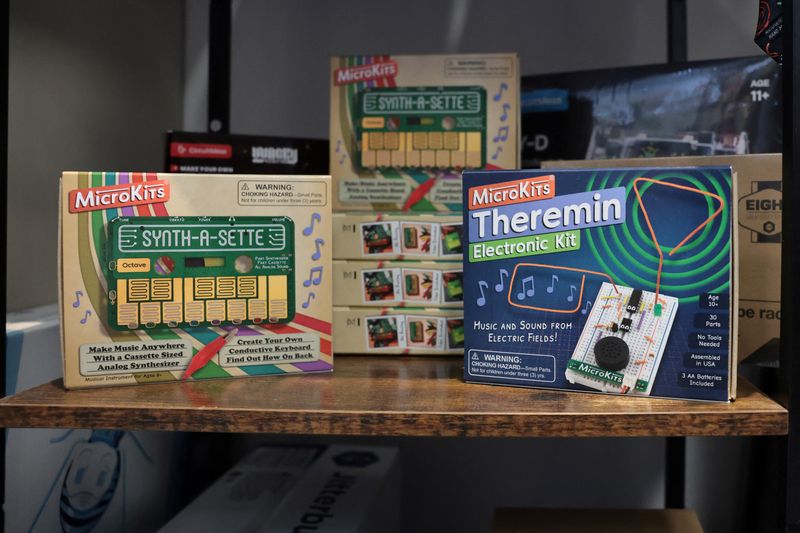Toy Maker Challenges Trump's Tariffs in Supreme Court Case

The Legal Battle Against Trump's Tariffs
Within days of Donald Trump announcing his sweeping "Liberation Day" tariffs in April, Rick Woldenberg was already looking for a law firm to help him sue the U.S. president. As the CEO of Learning Resources, an educational toy company based in the Chicago suburbs, he felt it was essential to protect what his family had built over generations.
Woldenberg, along with attorneys at Akin Gump, will be appearing before the U.S. Supreme Court on Wednesday to challenge the legality of Trump’s tariffs. The case, known as Learning Resources v. Trump, is one of several lawsuits arguing that the Republican president’s tariffs are unlawful. Two other related cases involve plaintiffs who claim the tariffs violate the law.
One of these cases was filed by Oregon and other Democratic-led states, while another was brought by the Liberty Justice Center, a libertarian nonprofit, on behalf of five small businesses. These include V.O.S. Selections, a wine distributor, and MicroKits, an educational toy company.
The Trump administration has requested the Supreme Court to act quickly in this case, although the court typically takes months to issue rulings after hearing arguments.
Large Companies Stay on the Sidelines
Despite the significant impact of the tariffs, large U.S. companies have largely stayed out of the litigation. They have not filed lawsuits or submitted amicus briefs, which are often used to support legal arguments from other parties.
In contrast, about a dozen small businesses have joined separate lawsuits brought by nonprofits challenging the tariffs. Additionally, 700 businesses signed onto an amicus brief filed by We Pay The Tariffs, an advocacy group opposing Trump’s actions.
John Horn, a professor at the Olin Business School at Washington University in St. Louis, explains that small and medium-sized businesses have been hit harder by the tariffs because they lack the flexibility of larger companies. Large corporations can stock up on inventory before tariffs take effect and better manage prices and supply chains. They also have more resources to lobby for exemptions, something smaller businesses cannot afford.
The Legal Challenge
At the heart of the Supreme Court case are the tariffs imposed under the International Emergency Economic Powers Act of 1977 (IEEPA). This law was originally intended for use during national emergencies. However, Trump declared the U.S. trade deficit a national emergency, even though the country has run trade deficits every year since 1975.
On April 2, as part of his "Liberation Day" announcement, Trump imposed a baseline tariff of 10% on virtually all countries, with higher rates ranging from 11% to 50% on dozens of nations. Three lower courts have ruled against these tariffs, stating they exceed Trump’s authority under IEEPA.
Importers like Learning Resources, which manufacture most of their products in Asia, bear the burden of these tariffs. While Trump promised that tariffs would help the U.S. become a "manufacturing nation once again," many importers say they struggle to move production back to the U.S. due to the unavailability or high cost of necessary parts and services.
Impact on Small Businesses
Woldenberg has seen the effects of the tariffs firsthand. In response, Learning Resources cut back expansion plans to preserve cash. He canceled a building project that would have added 600,000 square feet of warehouse and office space, and abandoned hiring plans for 2025. Marketing and training budgets were also reduced.
David Levi, founder of MicroKits, a smaller toy company in Virginia, shares similar concerns. His business imports electronic parts from China and assembles them in the U.S. When tariffs on Chinese imports spiked above 100%, he temporarily stopped importing and slowed production. He reduced his part-time employee’s hours and produced significantly fewer toys than expected.
Levi, who founded MicroKits in 2020, had planned to reach $1 million in revenue by 2025 but now expects only around $400,000 this year. He noted that domestic electrical clips needed for his products are far more expensive and designed for aerospace and medical uses, making them impractical for consumer-grade applications.
A Growing Movement
Victor Schwartz, founder of V.O.S. Selections, a wine distributor, felt a "moral imperative" to challenge the tariffs. He estimates the tariffs have cost his company about $200,000. Wine importers face additional challenges, including inflation, a weakening dollar, and declining U.S. alcohol consumption.
Jeffrey Schwab, a lawyer at the Liberty Justice Center, said the organization received an overwhelming response from small businesses across the country after issuing a public call for plaintiffs. “Our team spoke with dozens of owners and selected five whose experiences best illustrate the broad harms caused by the tariffs,” he said.
For many small business owners, the fight against the tariffs is not just about money—it’s about the ability to plan and grow in a stable environment. As the Supreme Court hears the case, the outcome could have far-reaching implications for how future presidents wield economic power.
Post a Comment for "Toy Maker Challenges Trump's Tariffs in Supreme Court Case"
Post a Comment